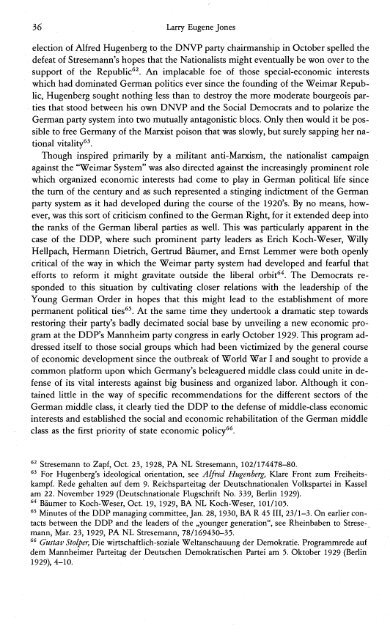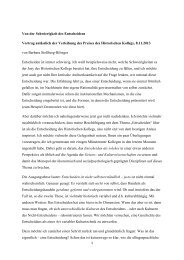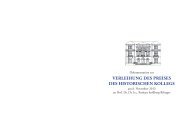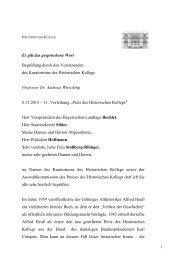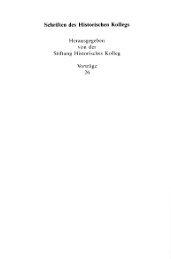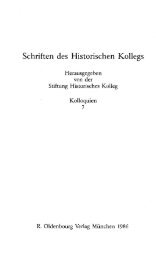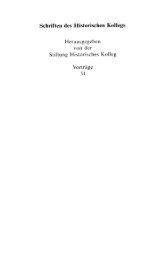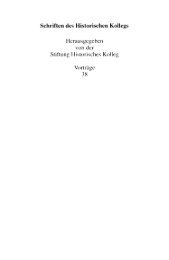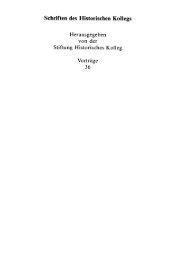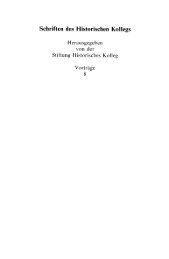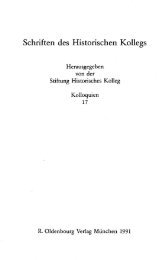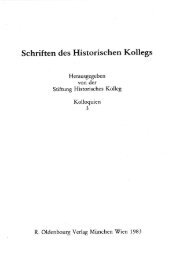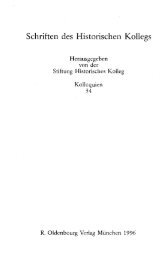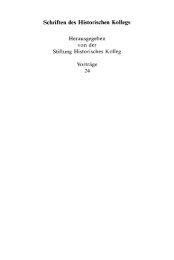Schriften des Historischen Kollegs - Kolloquien 6 - Historisches Kolleg
Schriften des Historischen Kollegs - Kolloquien 6 - Historisches Kolleg
Schriften des Historischen Kollegs - Kolloquien 6 - Historisches Kolleg
Erfolgreiche ePaper selbst erstellen
Machen Sie aus Ihren PDF Publikationen ein blätterbares Flipbook mit unserer einzigartigen Google optimierten e-Paper Software.
36 Larry Eugene Jones<br />
election of Alfred Hugenberg to the DNVP party chairmanship in October spelled the<br />
defeat of Stresemann's hopes that the Nationalists might eventually be won over to the<br />
support of the Republic 62 . An implacable foe of those special-economic interests<br />
which had dominated German politics ever since the founding of the Weimar Republic,<br />
Hugenberg sought nothing less than to <strong>des</strong>troy the more moderate bourgeois parties<br />
that stood between his own DNVP and the Social Democrats and to polarize the<br />
German party system into two mutually antagonistic bioes. Only then would it be possible<br />
to free Germany of the Marxist poison that was slowly, but surely sapping her national<br />
vitality63.<br />
Though inspired primarily by a militant anti-Marxism, the nationalist campaign<br />
against the "Weimar System" was also directed against the increasingly prominent role<br />
which organized economic interests had come to play in German political life since<br />
the turn of the century and as such represented a stinging indictment of the German<br />
party system as it had developed during the course of the 1920's. By no means, however,<br />
was this sort of criticism confined to the German Right, for it extended deep into<br />
the ranks of the German liberal parties as weIl. This was particularly apparent in the<br />
case of the DDP, where such prominent party leaders as Erich Koch-Weser, Willy<br />
Hellpach, Hermann Dietrich, Gertrud Bäumer, and Ernst Lemmer were both openly<br />
critical of the way in which the Weimar party system had developed and fearful that<br />
efforts to reform it might gravitate outside the liberal orbit 64 . The Democrats responded<br />
to this situation by cultivating doser relations with the leadership of the<br />
Y oung German Order in hopes that this might lead to the establishment of more<br />
permanent political ties 65 . At the same time they undertook a dramatic step towards<br />
restoring their party's badly decimated social base by unveiling a new economic program<br />
at the DDP's Mannheim party congress in early October 1929. This program addressed<br />
itself to those social groups which had been victimized by the general course<br />
of economic development since the outbreak of World War land sought to provide a<br />
common platform upon which Germany's beleaguered middle dass could unite in defense<br />
of its vital interests against big business and organized labor. Although it contained<br />
little in the way of specific recommendations for the different sectors of the<br />
German middle dass, it dearly tied the DDP to the defense of middle-dass economic<br />
interests and established the social and economic rehabilitation of the German middle<br />
dass as the first priority of state economic pOlicy66.<br />
62 Stresemann to Zapf, Oct. 23, 1928, PA NL Stresemann, 102/174478-80.<br />
63 For Hugenberg's ideological orientation, see Al/red Hugenberg, Klare Front zum Freiheitskampf.<br />
Rede gehalten auf dem 9. Reichsparteitag der Deutschnationalen Volkspartei in Kassel<br />
am 22. November 1929 (Deutschnationale Flugschrift No. 339, Berlin 1929).<br />
64 Bäumer to Koch-Weser, Oct. 19, 1929, BA NL Koch-Weser, 101/105.<br />
65 Minutes of the DDP managing committee, Jan. 28, 1930, BA R 45 III, 23/1-3. On earlier contacts<br />
between the DDP and the leaders of the "younger generation", see Rheinbaben to Strese-.<br />
mann, Mar. 23, 1929, PA NL Stresemann, 78/169430-35.<br />
66 Gustav Stolper, Die wirtschaftlich-soziale Weltanschauung der Demokratie. Programmrede auf<br />
dem Mannheimer Parteitag der Deutschen Demokratischen Partei am 5. Oktober 1929 (Berlin<br />
1929),4-10.


